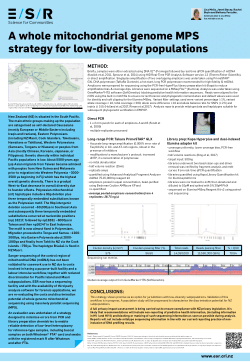Origins of Polynesian Pigs Revealed by Mitochondrial Whole Genome Ancient DNA
- Description:
- Domestic pigs (Sus scrofa) were first transported to Polynesia through a series of long-distance voyages ultimately linked to the Neolithic expansion of Austronesian-speaking people out of Asia. The descendants of the founding pigs belong to a rare mtDNA group referred to as the "Pacific Clade" that may have originated in peninsular or island Southeast Asia. We report the first whole genome mtD...
- Display date:
- 2022-09-18
- Location:
- Polynesia
- Format:
- Scholarly text
- Collections:
- Otago University Research Archive
- Contributors:
- Horsburgh, K. Ann
- Publisher:
- MDPI
- Content partner:
- University of Otago
- Availability:
- Not specified
-
Copyright status: Share, modifyFind out more about what you are able to do with this itemMore informationUniversity of Otago has this to say about the rights status of this item:
Copyright © The Author(s) 2022. This work was first published in Animals (MDPI). This is an open access article distributed under the terms of the Creative Commons Attribution 4.0 International License (http://www.creativecommons.org/licenses/by/4.0/), which permits unrestricted use, sharing, adaptation, distribution and reproduction in any medium or format, provided that the original work is properly attributed to the creator(s) and the source, a link to the Creative Commons license is provided, and any changes made are indicated.
What can I do with this item?Non-infringing useNZ copyright law does not prevent every use of a copyright work, and this item may be hosted by an international institute or organisation. You should consider what you can and cannot do with a copyright work.Share itThis item is suitable for copying and sharing with others, without further permission.Modify itThis item is suitable for modifying, remixing and building upon, without further permission.Check about commercial useYou'll need to confirm with the copyright holder using this item for commercial purposes.
The information on this site has been gathered from our content partners.
The names, terms, and labels that we present on the site may contain images or voices of deceased persons and may also reflect the bias, norms, and perspective of the period of time in which they were created. We accept that these may not be appropriate today.
If you have any concerns or questions about an item, please contact us.
